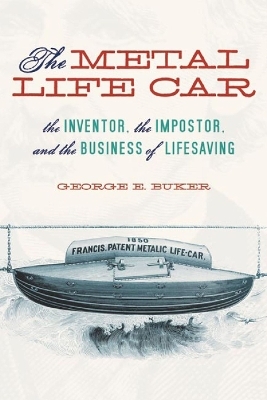
The Metal Life Car
The Inventor, the Imposter, and the Business of Lifesaving
Seiten
2008
The University of Alabama Press (Verlag)
978-0-8173-1608-2 (ISBN)
The University of Alabama Press (Verlag)
978-0-8173-1608-2 (ISBN)
- Titel z.Zt. nicht lieferbar
- Portofrei ab CHF 40
- Auch auf Rechnung
- Artikel merken
Joseph Francis was the inventor of metal lifeboats. While Francis was busy in Europe, Captain Douglass Ottinger, US Revenue Marine Service, claimed to be the inventor of Francis' life car and obtained support in the US Congress and the Patent Office for his claim. Francis had to battle for decades to prove his rights.
For centuries sailing vessels crept along the coastline, ready to flee ashore in case of danger or trouble; this worked well until weather or poor sailing drove these ships against an unforgiving coast. Saviors and salvors (often the same people) struggled to rescue both humans and cargo, often with results as tragic for them as for the sailors and passengers. Joseph Francis (b. Boston, Massachusetts, 1801) was an inventor who also had the ability to organize a business to produce his inventions and the salesmanship to sell his products. His metal lifeboats, first used in survey expeditions in Asia Minor and Central America, came into demand among the world's merchant marine, the U.S. Navy, and the U.S. Revenue Service. His corrugated 'life car' was the keystone to development of the U.S. Life-Saving Service. Francis's metal bateaux and lifeboats played an important role in the Third Seminole War in Florida. His metal pontoon army wagons served in the trans-Mississippi campaigns against the Indians. In Europe, he was acclaimed as a genius and sold patent rights to shipyards in Liverpool and the Woolwich Arsenal in England, Le Havre seaport in France, in the free city of Hamburg, and in the Russian Empire. But while Francis was busy in Europe, Captain Douglass Ottinger, U.S. Revenue Marine Service, claimed to be the inventor of Francis's life car and obtained support in the U.S. Congress and the Patent Office for his claim. Francis had to battle for decades to prove his rights, and Americans remained generally unfamiliar with his devices, thereby condemning Civil War armies to inferior copies while Europe was using, and acclaiming, his inventions.
For centuries sailing vessels crept along the coastline, ready to flee ashore in case of danger or trouble; this worked well until weather or poor sailing drove these ships against an unforgiving coast. Saviors and salvors (often the same people) struggled to rescue both humans and cargo, often with results as tragic for them as for the sailors and passengers. Joseph Francis (b. Boston, Massachusetts, 1801) was an inventor who also had the ability to organize a business to produce his inventions and the salesmanship to sell his products. His metal lifeboats, first used in survey expeditions in Asia Minor and Central America, came into demand among the world's merchant marine, the U.S. Navy, and the U.S. Revenue Service. His corrugated 'life car' was the keystone to development of the U.S. Life-Saving Service. Francis's metal bateaux and lifeboats played an important role in the Third Seminole War in Florida. His metal pontoon army wagons served in the trans-Mississippi campaigns against the Indians. In Europe, he was acclaimed as a genius and sold patent rights to shipyards in Liverpool and the Woolwich Arsenal in England, Le Havre seaport in France, in the free city of Hamburg, and in the Russian Empire. But while Francis was busy in Europe, Captain Douglass Ottinger, U.S. Revenue Marine Service, claimed to be the inventor of Francis's life car and obtained support in the U.S. Congress and the Patent Office for his claim. Francis had to battle for decades to prove his rights, and Americans remained generally unfamiliar with his devices, thereby condemning Civil War armies to inferior copies while Europe was using, and acclaiming, his inventions.
Commander George E. Buker, USN (Ret.) is Professor Emeritus of History at Jacksonville University (Florida) and the author of a number of books, including Blockaders, Refugees, and Contrabands: The Civil War on Florida's Gulf Coast; Swamp Sailors in the Second Seminole War ; and The Penobscot Expedition: Commodore Saltonstall and the Massachusetts Conspiracy of 1779.
| Erscheint lt. Verlag | 30.4.2008 |
|---|---|
| Zusatzinfo | 16 |
| Verlagsort | Alabama |
| Sprache | englisch |
| Gewicht | 460 g |
| Themenwelt | Geschichte ► Teilgebiete der Geschichte ► Technikgeschichte |
| Geschichte ► Teilgebiete der Geschichte ► Wirtschaftsgeschichte | |
| Sozialwissenschaften ► Politik / Verwaltung | |
| Technik ► Fahrzeugbau / Schiffbau | |
| ISBN-10 | 0-8173-1608-6 / 0817316086 |
| ISBN-13 | 978-0-8173-1608-2 / 9780817316082 |
| Zustand | Neuware |
| Haben Sie eine Frage zum Produkt? |
Mehr entdecken
aus dem Bereich
aus dem Bereich
Buch | Softcover (2024)
Lehmanns Media (Verlag)
CHF 27,90
Digitalisierung neu denken für eine gerechte Gesellschaft
Buch | Hardcover (2023)
Quadriga (Verlag)
CHF 27,95
Vom Perceptron zum Deep Learning
Buch | Softcover (2022)
Springer Vieweg (Verlag)
CHF 27,95


